Undreading unsolicited proposals in PPPs
Undreading unsolicited proposals in PPPs
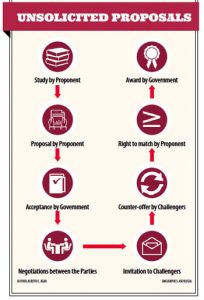 DO Philippine laws and regulations allow unsolicited proposals (UPs) in public-private partnerships (PPPs)? What are the advantages of UPs? Are there competition, accountability and transparency in UPs? What are the basic differences between solicited and UP procedures?
DO Philippine laws and regulations allow unsolicited proposals (UPs) in public-private partnerships (PPPs)? What are the advantages of UPs? Are there competition, accountability and transparency in UPs? What are the basic differences between solicited and UP procedures?
To distinguish, solicited or open-bidding procedures originate from the government, while in UPs, the project studies are prepared by the private-sector proponent (PSP). Once a UP is accepted, the PSP becomes an original proponent (OP) and no other proposal for the same project will be entertained by the government.
In open bidding, all bids are measured against the parameter set by the implementing agency (IA). In a UP, the proposal of the challengers must be better than the negotiated terms between the OP and IA. Depending on the modality, the OP has the right to match or the opportunity to outbid superior offers. If there is no challenger, the project is awarded to the OP. A premium is given the OP for taking initiative and spending for the preparation of the study with no assurance of getting the PPP contract.

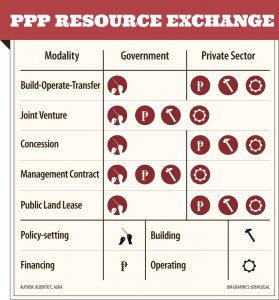 Are the resources of government sufficient to be able to undertake all infrastructure projects and public services? What are the contributions of government and the private sector in a public-private partnership (PPP)? What is in it for the people, government and the private sector when it participates in a PPP? Should there be a triple win arrangement?
Are the resources of government sufficient to be able to undertake all infrastructure projects and public services? What are the contributions of government and the private sector in a public-private partnership (PPP)? What is in it for the people, government and the private sector when it participates in a PPP? Should there be a triple win arrangement?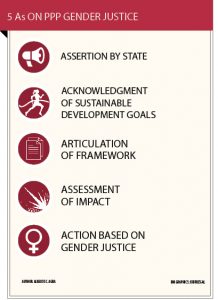 Why is promoting women and girls’ rights important in achieving the purpose of public-private partnerships (PPPs)? How can PPPs improve the quality of life of women and girls? How do we dovetail PPP justice with gender justice?
Why is promoting women and girls’ rights important in achieving the purpose of public-private partnerships (PPPs)? How can PPPs improve the quality of life of women and girls? How do we dovetail PPP justice with gender justice?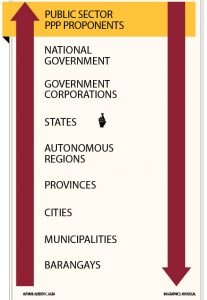 Is there a difference in terms of public-private partnership (PPP) under a unitary or federal form of government? If the country federates, as being advocated by the incoming president, will this support or block PPPs at the provincial, city, municipal or barangay level? Will another layer of bureaucracy be facilitative of development through PPPs?
Is there a difference in terms of public-private partnership (PPP) under a unitary or federal form of government? If the country federates, as being advocated by the incoming president, will this support or block PPPs at the provincial, city, municipal or barangay level? Will another layer of bureaucracy be facilitative of development through PPPs?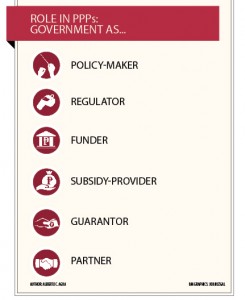 How can risks attending a public-private partnership (PPP) arrangement be mitigated? How can the general public be shielded from the harmful effects of a failed PPP project? How can the Trade and Investment Development Corp. of the Philippines (Tidcorp) help de-socialize losses and risks?
How can risks attending a public-private partnership (PPP) arrangement be mitigated? How can the general public be shielded from the harmful effects of a failed PPP project? How can the Trade and Investment Development Corp. of the Philippines (Tidcorp) help de-socialize losses and risks?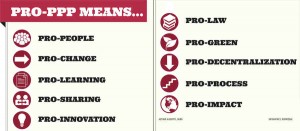 Regardless of who wins in today’s presidential elections, whether he or she belongs to a political party or is running as an independent, this voter expects the next president to be pro-public-private partnership (PPP). Even if I were a voter in another country, I will also demand that a pro-PPP stance must be advanced by candidates and would-be head of state.
Regardless of who wins in today’s presidential elections, whether he or she belongs to a political party or is running as an independent, this voter expects the next president to be pro-public-private partnership (PPP). Even if I were a voter in another country, I will also demand that a pro-PPP stance must be advanced by candidates and would-be head of state.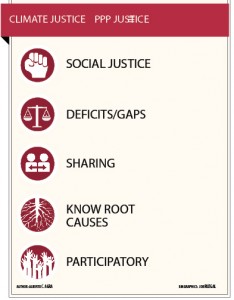 How can “climate justice” be likened to “public-private partnership [PPP] justice?” Why is justice even relevant when we talk about climate and PPPs? How can social justice be integrated into PPP and climate justice? What makes PPP just and unjust?
How can “climate justice” be likened to “public-private partnership [PPP] justice?” Why is justice even relevant when we talk about climate and PPPs? How can social justice be integrated into PPP and climate justice? What makes PPP just and unjust?